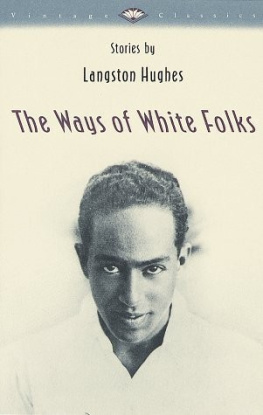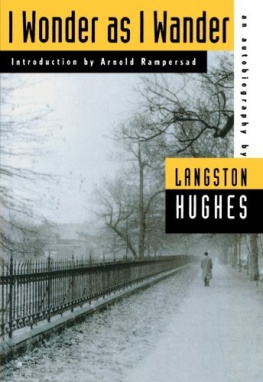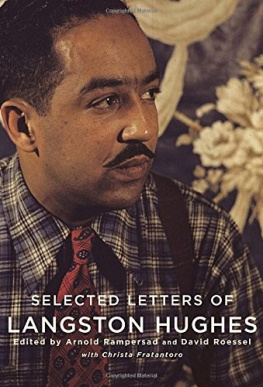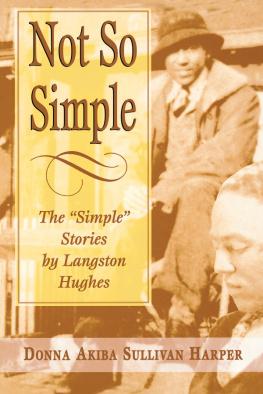Langston Hughes - The Ways of White Folks: Stories
Here you can read online Langston Hughes - The Ways of White Folks: Stories full text of the book (entire story) in english for free. Download pdf and epub, get meaning, cover and reviews about this ebook. year: 1990, publisher: Vintage, genre: History. Description of the work, (preface) as well as reviews are available. Best literature library LitArk.com created for fans of good reading and offers a wide selection of genres:
Romance novel
Science fiction
Adventure
Detective
Science
History
Home and family
Prose
Art
Politics
Computer
Non-fiction
Religion
Business
Children
Humor
Choose a favorite category and find really read worthwhile books. Enjoy immersion in the world of imagination, feel the emotions of the characters or learn something new for yourself, make an fascinating discovery.
- Book:The Ways of White Folks: Stories
- Author:
- Publisher:Vintage
- Genre:
- Year:1990
- Rating:4 / 5
- Favourites:Add to favourites
- Your mark:
- 80
- 1
- 2
- 3
- 4
- 5
The Ways of White Folks: Stories: summary, description and annotation
We offer to read an annotation, description, summary or preface (depends on what the author of the book "The Ways of White Folks: Stories" wrote himself). If you haven't found the necessary information about the book — write in the comments, we will try to find it.
The Ways of White Folks: Stories — read online for free the complete book (whole text) full work
Below is the text of the book, divided by pages. System saving the place of the last page read, allows you to conveniently read the book "The Ways of White Folks: Stories" online for free, without having to search again every time where you left off. Put a bookmark, and you can go to the page where you finished reading at any time.
Font size:
Interval:
Bookmark:
POETRY
The Panther and the Lash (1967)
Ask Your Mama (1961)
Selected Poems of Langston Hughes (1958)
Montage of a Dream Deferred (1951)
One-Way Ticket (1949)
Fields of Wonder (1947)
Shakespeare in Harlem (1942)
The Dream-Keeper (1932)
Fine Clothes to the Jew (1927)
The Weary Blues (1926)
FICTION
Five Plays by Langston Hughes (1963)
Something in Common and Other Stories (1963)
The Sweet Flypaper of Life (1955)
Laughing to Keep from Crying (1952)
Not Without Laughter (1930)
HUMOR
Simples Uncle Sam (1965)
Best of Simple (1961)
Simple Stakes a Claim (1957)
Simple Takes a Wife (1953)
Simple Speaks His Mind (1950)
FOR YOUNG PEOPLE
First Book of Africa (1964)
The First Book of the West Indies (1956)
The First Book of Rhythms (1954)
The First Book of Jazz (1954)
The First Book of the Negroes (1952)
with Arna Bontemps
Popo and Fifina (1932)
BIOGRAPHY AND AUTOBIOGRAPHY
Famous Negro Heroes of America (1958)
I Wonder As I Wander (1956)
Famous Negro Music-Makers (1955)
Famous American Negroes (1954)
The Big Sea (1940)
ANTHOLOGY
The Langston Hughes Reader (1958)
HISTORY
with Milton Meltzer
Black Magic: A Pictorial History of the Negro in American Entertainment (1967)
Fight for Freedom: The Story of the NAACP (1962)
with Milton Meltzer
A Pictorial History of the Negro in America (1956)
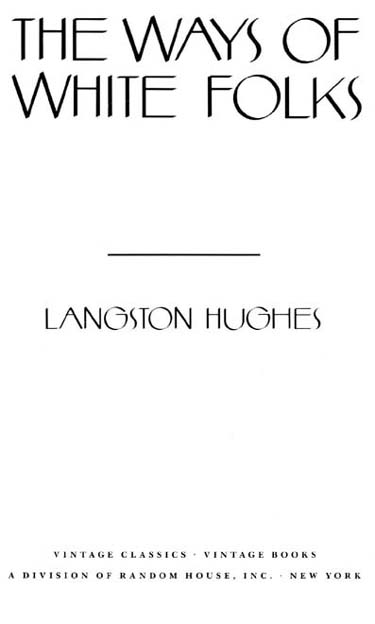
VINTAGE CLASSICS EDITION
SEPTEMBER 1990
Copyright 1933, 1934 by Alfred A. Knopf, Inc.
Copyright renewed 1962 by Langston Hughes
All rights reserved under International and Pan-American Copyright Conventions. Published in the United States by Vintage Books, a division of Random House, Inc., New York, and simultaneously in Canada by Random House of Canada Limited, Toronto. Originally published by Alfred A. Knopf, Inc., New York, in 1934.
Library of Congress Cataloging-in-Publication Data
Hughes, Langston, 19021967.
The ways of white folks/Langston Hughes.
p. cm.
eISBN: 978-0-307-80657-4
I. Title.
PS3515.U274W3 1990 89-40480
813.52dc20
Thanks are due the editors of Esquire, The American Mercury, Scribners, Opportunity, The Brooklyn Daily Eagle, Debate, and Abbotts Monthly for permission to reprint certain of these stories first published in their pages.
Display typography by Stephanie Bart-Horvath
v3.1
To Nol Sullivan
CONTENTS
The ways of white folks,
I mean some white folks.
BERRY
M ELTON WAS ONE OF THOSE miserable in-between little places, not large enough to be a town, nor small enough to be a villagethat is, a village in the rural, charming sense of the word. Melton had no charm about it. It was merely a nondescript collection of houses and buildings in a region of farmsone of those sad American places with sidewalks, but no paved streets; electric lights, but no sewage; a station, but no trains that stopped, save a jerky local, morning and evening. And it was 150 miles from any city at alleven Sioux City.
Cora Jenkins was one of the least of the citizens of Melton. She was what the people referred to when they wanted to be polite, as a Negress, and when they wanted to be rude, as a niggersometimes adding the word wench for no good reason, for Cora was usually an inoffensive soul, except that she sometimes cussed.
She had been in Melton for forty years. Born there. Would die there probably. She worked for the Studevants, who treated her like a dog. She stood it. Had to stand it; or work for poorer white folks who would treat her worse; or go jobless. Cora was like a treeonce rooted, she stood, in spite of storms and strife, wind, and rocks, in the earth.
She was the Studevants maid of all workwashing, ironing, cooking, scrubbing, taking care of kids, nursing old folks, making fires, carrying water.
Cora, bake three cakes for Marys birthday tomorrow night. You Cora, give Rover a bath in that tar soap I bought. Cora, take Ma some jello, and dont let her have even a taste of that raisin pie. Shell keep us up all night if you do. Cora, iron my stockings. Cora, come here Cora, put Cora Cora Cora! Cora!
And Cora would answer, Yes, mam.
The Studevants thought they owned her, and they were perfectly right: they did. There was something about the teeth in the trap of economic circumstance that kept her in their power practically all her lifein the Studevant kitchen, cooking; in the Studevant parlor, sweeping; in the Studevant backyard, hanging clothes.
You want to know how that could be? How a trap could close so tightly? Here is the outline:
Cora was the oldest of a family of eight childrenthe Jenkins niggers. The only Negroes in Melton, thank God! Where they came from originallythat is, the old folksGod knows. The kids were born there. The old folks are still there now: Pa drives a junk wagon The old woman ails around the house, ails and quarrels. Seven kids are gone. Only Cora remains. Cora simply couldnt go, with nobody else to help take care of Ma. And before that she couldnt go, with nobody to see that her brothers and sisters got through school (she the oldest, and Ma ailing). And before thatwell, somebody had to help Ma look after one baby behind another that kept on coming.
As a child Cora had no playtime. She always had a little brother, or a little sister in her arms. Bad, crying, bratty babies, hungry and mean. In the eighth grade she quit school and went to work with the Studevants.
After that, she ate better. Half days work at first, helping Ma at home the rest of the time. Then full days, bringing home her pay to feed her fathers children. The old man was rather a drunkard. What little money he made from closet-cleaning, ash-hauling, and junk-dealing he spent mostly on the stuff that makes you forget you have eight kids.
He passed the evenings telling long, comical lies to the white riff-raff of the town, and drinking licker. When his horse died, Coras money went for a new one to haul her Pa and his rickety wagon around. When the mortgage money came due, Coras wages kept the man from taking the roof from over their heads. When Pa got in jail, Cora borrowed ten dollars from Mrs. Studevant and got him out.
Cora stinted, and Cora saved, and wore the Studevants old clothes, and ate the Studevants leftover food, and brought her pay home. Brothers and sisters grew up. The boys, lonesome, went away, as far as they could from Melton. One by one, the girls left too, mostly in disgrace. Ruinin ma name, Pa Jenkins said, Ruinin ma good name! They cant go out berryin but what they come back in disgrace. There was something about the cream-and-tan Jenkins girls that attracted the white farm hands.
Even Cora, the humble, had a lover once. He came to town on a freight train (long ago now), and worked at the livery-stable. (That was before autos got to be so common.) Everybody said he was an I. W. W. Cora didnt care. He was the first man and the last she ever remembered wanting. She had never known a colored lover. There werent any around. That was not her fault.
Font size:
Interval:
Bookmark:
Similar books «The Ways of White Folks: Stories»
Look at similar books to The Ways of White Folks: Stories. We have selected literature similar in name and meaning in the hope of providing readers with more options to find new, interesting, not yet read works.
Discussion, reviews of the book The Ways of White Folks: Stories and just readers' own opinions. Leave your comments, write what you think about the work, its meaning or the main characters. Specify what exactly you liked and what you didn't like, and why you think so.

